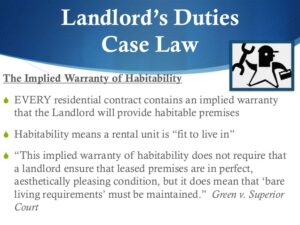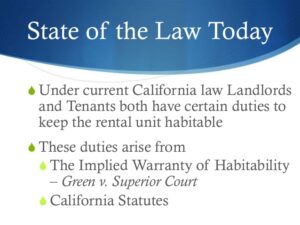 Over the years I took the deposition of several landlords – each of whom did not know the first thing about what the term “habitability” meant, nor could they articulate the law with respect to their requirements as a landlord. “[I]gnorance of the law is no excuse,” and many landlords and property owners have managed to skate by without knowing they are violating the law when it comes to habitability of rental units. California Civil Code Section 1941 et. seq. states in pertinent part that “a rental unit is required to be fit, or habitable, to live in and rent by tenants. The rental unit must substantially comply with local and state building, health, and safety codes that materially affect the tenant’s health and safety.” In California landlords and tenants each bear responsibility for certain kinds of repairs – however landlords ultimately are legally responsible for making sure the rental unit is habitable.
Over the years I took the deposition of several landlords – each of whom did not know the first thing about what the term “habitability” meant, nor could they articulate the law with respect to their requirements as a landlord. “[I]gnorance of the law is no excuse,” and many landlords and property owners have managed to skate by without knowing they are violating the law when it comes to habitability of rental units. California Civil Code Section 1941 et. seq. states in pertinent part that “a rental unit is required to be fit, or habitable, to live in and rent by tenants. The rental unit must substantially comply with local and state building, health, and safety codes that materially affect the tenant’s health and safety.” In California landlords and tenants each bear responsibility for certain kinds of repairs – however landlords ultimately are legally responsible for making sure the rental unit is habitable.
 Landlords are Required to Make Certain Repairs or Face Consequences
Landlords are Required to Make Certain Repairs or Face Consequences
Prior to renting a unit to be placed in the stream of commerce landlords must make certain that the unit is habitable, or stated another way, must be fit to live in, or fit for its particular purpose. After the unit is rented to a tenant the landlord must also make sure that all of the components of the rental unit keep working the way they are designed. If something fails the landlord must repair it. Since 1974 when the California Supreme Court heard Green vs. Superior Court (1974) 10 Cal. 3d 616 and held that landlords who rent property to tenants do so with an implied warranty of habitability. Under the implied warranty of habitability the landlord must repair substantial defects in the rental unit which fail to comply with health and safety laws. Importantly, landlords are not required to repairs damages which were the direct result of the tenants, tenant’s guests, or tenant’s pets’ acts or conduct.
What are Conditions that make a Rental Unit Uninhabitable?
A rental unit can be considered uninhabitable if there is a lead hazard that endangers the tenants or public, if the building is substandard due to a structural hazard, if the building has inadequate sanitation, or if a nuisance exists that endangers the health, safety, or welfare of the tenants or the public. A rental unit can be considered uninhabitable if it substantially lacks:
- Effective waterproofing, weather protection of roof and exterior walls, including unbroken windows and doors
- Plumbing facilities in working order, hot and cold running water, connected to a functional sewage disposal system
- Gas system in good working order (if gas appliances are present)
- Heating system in good working order
- Electric system in good working order
- Clean and sanitary buildings, grounds, appurtenances, free from debris, filth, rubbish, garbage, rodents and vermin
- Adequate trash receptacles in good repair
- Floors, stairways and hand railings in good repair
- A working toilet, wash basin, and bathtub or shower (in a room which is ventilated and affords privacy)
- A kitchen with a sink that can’t be made of an absorbent material such as wood
- Natural lighting in every room with minimum ventilation (1/2 the depth or width of the window frame)
- Safe fire or emergency exits leading to a street or hallway
- Operable dead bolts on the main entry doors – operable locking devices on windows
- Working smoke detectors in all bedrooms and hallways leading to bedrooms (with a 10 year battery) See smoke detector article here
- Working carbon monoxide detectors in each unit – See carbon monoxide detector article here
- The presence of mold in a unit that affects the habitability must be eliminated
 Tenants Also Have Responsibilities to Reduce and Mitigate Issues
Tenants Also Have Responsibilities to Reduce and Mitigate Issues
Tenants are required to take reasonable steps to maintain the rental unit. Tenants are charged with the following responsibilities:
- Keep the rental unit “as clean and sanitary as the condition of the premises permits”
- Use and operate gas, electrical, and plumbing fixtures properly and how they are designed to be used
- Dispose of trash/garbage in a sanitary manner
- Refrain from destroying or damaging the premises
- No modifications or alterations of the premises
- Use of the premises in a lawful and intended manner
Rental Agreements Can Specify Tenants Make Minor Repairs
The rental agreement can be drafted such that the tenant agrees to make minor repairs and deducts the costs from the rent owing. This type of an agreement must be made in good faith and there must be a real reduction in rent. More importantly no matter what the rental agreement says a landlord cannot draft away their statutory obligations for maintaining a habitable rental unit.
Many Landlords Don’t Do Their Homework
Unfortunately, most landlords are not fully aware of, nor are they interested in completely understanding their obligations under the law. Many landlords use illegal leases, fail to follow Federal Guidelines for housing discrimination, charge excessive security deposits, and generally disregard the law in every respect. These facts result in landlord-tenant disputes that are completely unnecessary if the landlord did their homework and just followed the law.
Professional Property Management Reduces Risk & Eliminates Headaches
A professional property manager will help make an investment property a better long-term asset, can reduce stress on the property owner, and make a lucrative and good decision. Trying to manage the rental property by oneself can lead to headaches, mistakes, and lawsuits.
Professional Property Management Costs Tax Deductible
The fees that come with professional property management are tax deductible for the property owner which will typically translate to about 50% real costs after taxes. So a 10% property management fee really only costs a property owner about 5%. When you do this math then understand that hiring a professional property manager who is also a real estate attorney and gives free legal advice to their clients is a much bigger bargain – all for about the 5% real cost. If you have any questions or concerns about property management, tax strategies, property investment, or basic real estate questions please contact me.
David currently is the broker/owner of several real estate related businesses which manage and maintain 300+ client properties on the San Francisco Peninsula.
Trust, transparency, and performance guarantees are the foundation of these businesses. David challenges anyone to find a PM professional that offers services similar - extensive education, customer service, and performance guarantees.
David also provides consulting for his clients on property development feasibility, construction, and complex real estate transactions.
David has authored a published law review article, two real estate books, and over 120 real estate blog articles.
- What is Driving the Growing Demand for Enhanced Electrical Capacity in Residential and Commercial Buildings? - November 25, 2024
- What Are All the Legal Tax Deductions in Commercial Real Estate (CRE)? - November 17, 2024
- What are Typical Commercial Property Management Fees? - November 15, 2024


